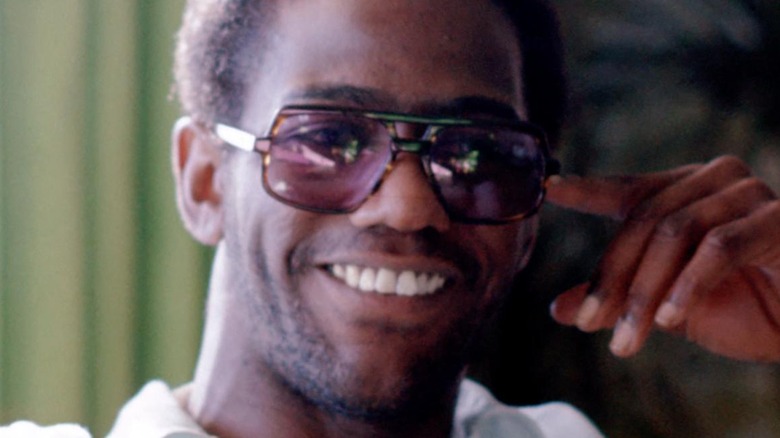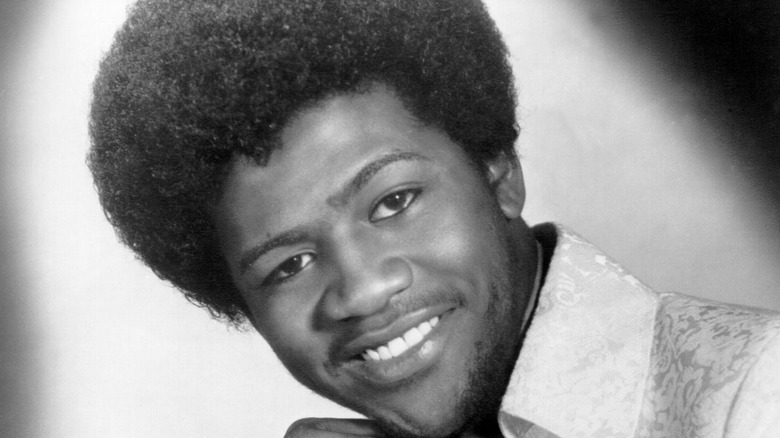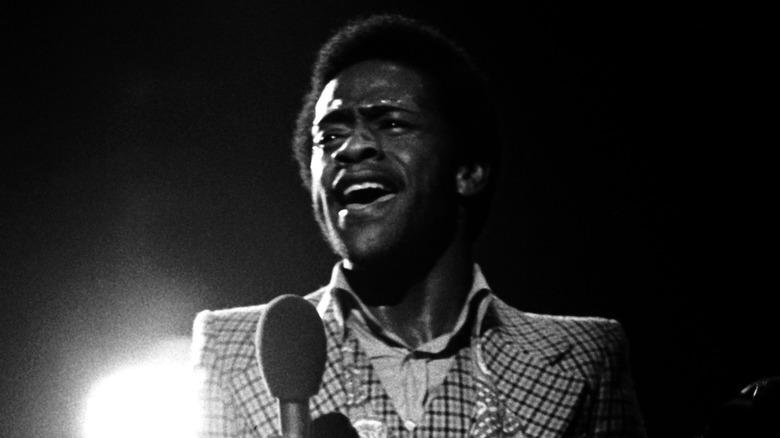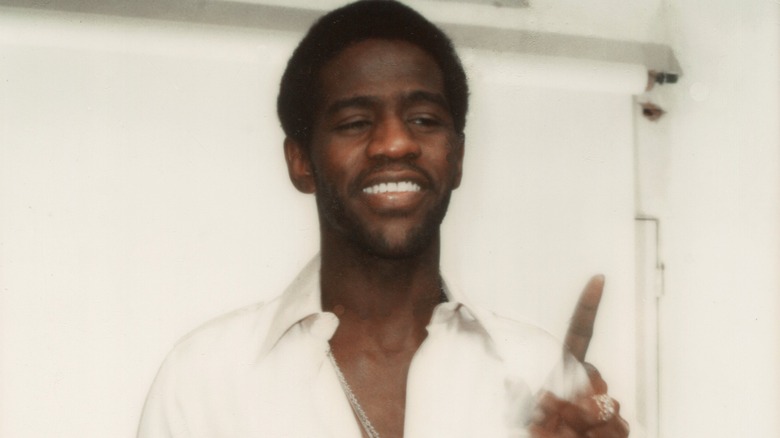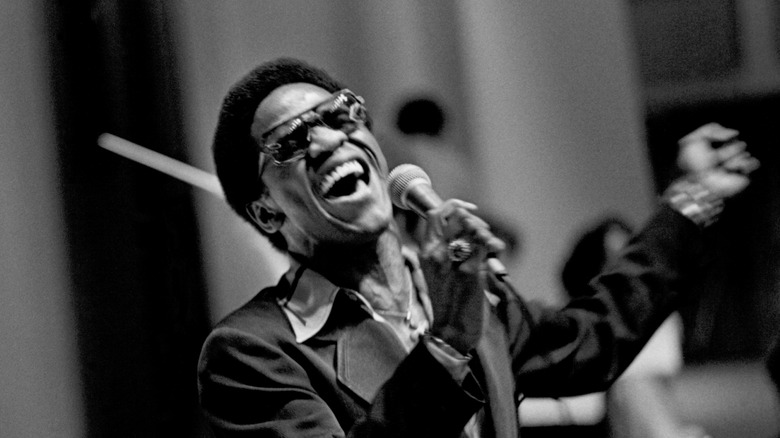The Untold Truth Of Al Green
Al Green has been referred to as "the first great soul singer of the '70s." Throughout the decade, Green dropped hits that were sensual or heartbreaking, and often both at the same time. But many people don't know that his career as a musician began decades before when, at the age of 9, he formed the gospel quartet the Green Brothers (via Spotify). While his career reached stratospheric success in the 1970s, the decade also presented Green with a handful of tragic incidents, from lawsuits and arrests to divorce and death. The decade would ultimately lead him to a religious catharsis that altered the course of his career at its peak, per Biography.
Green's soul smash hits, like "Tired of Being Alone" and "Let's Stay Together," remain well-known classics today. But many details of Green's life — his most surprising sonic influences, his family issues, run-ins with the law, and the tragic event that changed his life — are lesser-known. Here are several details that provide a fuller picture of the life behind some of the most poignant soul hits of the 1970s.
Al Green has an unapologetic love for rock 'n' roll and hip-hop
Al Green may be a man of soul, but his sonic influences vary from gospel to rock 'n' roll to hip-hop. He discussed the sounds that moved him during a 2005 interview for New York Magazine. He remembered growing up on "all the great gospel singers," name-checking Mahalia Jackson. "But the most important music to me was those hip-shakin' boys: Wilson Pickett and Elvis Presley," he said, adding that his favorite song as a 13-year-old was Elvis' "Love Me Tender."
In the 1950s, a young Green was playing in a gospel quartet called the Green Brothers — until his father banned him from the group after catching him spinning Jackie Wilson records, per Spotify.
While shaping his sound throughout the '60s, Green listened to jazz and the popular music of the time, like Roy Orbison, The Beatles, and The Doors, per New York Magazine. Perhaps most surprising of all is his love of hip-hop, "especially Queen Latifah and Run-D.M.C." Throughout his time as a reverend, Green's love of hip-hop has surprised his parishioners. "My parishioner would say [in a scornful tone], 'Reverend!'" Green recalled, "but I didn't pay him no mind."
Al Green experienced a tragic 'nightmare' at his Tennessee home in 1974
In the early morning hours on October 18, 1974, Al Green was at home at his 60-acre, 21-room estate in Shelby Forest State Park, a suburb of Memphis, Tennessee. Around 1:15 a.m., he was preparing to take a bath when a woman named Mary Woodson poured boiling grits on him, leaving him with second-degree burns on his arms, back, and stomach, per Jet magazine. Shortly thereafter, Woodson fatally shot herself with a .38 caliber revolver that belonged to Green.
Woodson left a note about how unhappy she was. Following the incident, Green told police that she had asked him that night to marry her, and he had declined. He later received skin grafts to help repair the burns all over his body.
"I'm deeply hurt because of Mary Woodson's disastrous action," Green later said (via Jet), "not because of what she did to me but because of the taking of her own life. I pray that God will forgive her and I find it difficult to sleep nights and I try to remove this tragedy from my mind because it was like a nightmare."
If you or anyone you know is having suicidal thoughts, please call the National Suicide Prevention Lifeline at 1-800-273-TALK (8255).
Al Green has faced multiple lawsuits and incidents involving money and violence
Just two days after Al Green left Memphis Baptist Hospital following his 1974 skin graft surgeries, one of his second cousins came to his office and held him at gunpoint, per Jet magazine. The cousin, who was not named by the press, claimed Green owed her money and demanded he hand it over. Green did not publicly comment on the matter, and he refused to press charges.
The following month, Green's former secretary Linda Willis sued him for assault and battery, seeking $100,000 in damages. According to Jet, Willis claimed Green pushed her through a glass door during a disagreement about her salary. Willis originally filed the suit in the Memphis City Court, but the case was dismissed due to "conflicting testimony," so she brought the case to the federal level. Green denied her claims, stating that she hit him and that they both fell through the glass door when he tried to push her away.
Then, on Memorial Day in 1977, Green got in a fight with his organist, Larry Robinson, who claimed Green owed him money for a show in Texas, per Jet. They were both arrested after the incident and charged with assault.
The following month, Green married his first wife, Shirley, but she filed for divorce a year later. In the decades that followed, she discussed his physical abuse against her with outlets including The Washington Post. Green admitted in court that he had been physically violent toward her.
If you or someone you know is dealing with domestic abuse, you can call the National Domestic Violence Hotline at 1−800−799−7233. You can also find more information, resources, and support at their website.
Al Green devoted himself to religion at the height of his fame
In 1976, two years after the tragic incident at his home, Al Green bought a church. According to the Encyclopedia of Arkansas, he paid for it with a blank piece of paper fashioned into a makeshift check. The church is located in Memphis, Tennessee, near Graceland, the famous home of Green's longtime inspiration Elvis Presley. Green called the church the Full Gospel Tabernacle and became its ordained pastor.
Green continued touring to promote his popular soul albums until 1979, when he fell off a stage while performing in Ohio. The Encyclopedia of Arkansas states that Green "viewed the incident as a message from God" and began playing gospel music exclusively afterward. Though his decision to turn away from soul at the peak of his career surprised fans, he had great success in the gospel realm, earning eight Grammy Awards and later being inducted into the Gospel Music Hall of Fame.
Green returned to recording and performing secular music in 1995. As of 2017, he remains the pastor of his church in Memphis.
Al Green's sister, Maxine, vanished in 2013
Al Green's sister, Maxine Green, was reported missing from her assisted living facility in August 2013. According to Fox, Maxine was 61 years old and reportedly dealing with schizophrenia and addiction issues. She was last seen during the first weekend of September in the northwest region of Grand Rapids, Michigan. "If something happened to Maxine Green, it happened that weekend," her daughter, Lasha Green, said in 2013 (via Fox). "It happened that weekend because that's the last time anyone said that they saw her."
Maxine's famous brother, Al, reportedly never mentioned Maxine's disappearance in the media or communicated with investigators. "I can't answer why Al Green has not even reached out — just reach out, talk to the public," Lasha said of her uncle's silence. "Let the public know that your sister is missing out of Grand Rapids, Michigan."
Lasha added that Al and Maxine had been "best friends — best brothers and sisters" and that they "had the closest relationship out of all the sisters and brothers."
In 2019, Fox reported that Maxine was still missing after six years.
If you or someone you know is struggling with mental health, please contact the Crisis Text Line by texting HOME to 741741, call the National Alliance on Mental Illness helpline at 1-800-950-NAMI (6264), or visit the National Institute of Mental Health website.
If you or anyone you know is struggling with addiction issues, help is available. Visit the Substance Abuse and Mental Health Services Administration website or contact SAMHSA's National Helpline at 1-800-662-HELP (4357).
